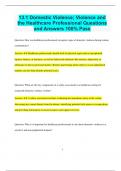Exam (elaborations)
13.1 Domestic Violence; Violence and the Healthcare Professional Questions and Answers 100% Pass
- Course
- Institution
13.1 Domestic Violence; Violence and the Healthcare Professional Questions and Answers 100% Pass Question: How can healthcare professionals recognize signs of domestic violence during routine examinations? Answer: Healthcare professionals should look for physical signs such as unexplain...
[Show more]



